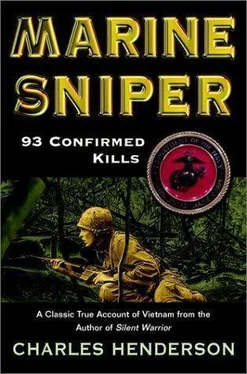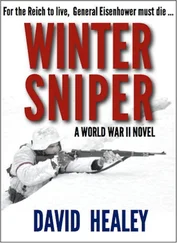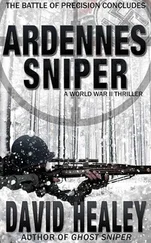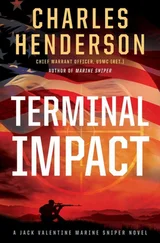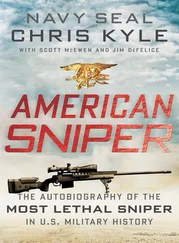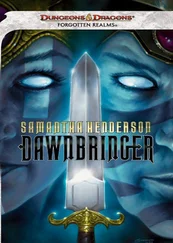The final paragraph of the report stated: “The patient is limited only in that he cannot perform his physical training exercises as prescribed by the Marine Corps. He is fully able to perform all the other physical duties required of his position. In addition, the demyelinating disease has caused only mild ataxia and has in no way interfered with his ability to perform his job. However, because of the improving nature of his neurological deficit, it is the opinion of the board that the patient is not yet fit for full duty, but is fit for limited duty.”
Although the report seemed uplifting, its findings actually were not. This demyelinating disease—what the physicians called his neurological deficit—was multiple sclerosis.
The doctor sat back in his leatherette chair and folded his arms. “Gunny. I’ve been around for a while, and I’m familiar with the ways of the Marine Corps. To be honest with you, I don’t think you’re going to make it on active duty. I think with what you have, the Office of Naval Disability Evaluation will give you a 60 percent disability retirement.”
“I thought I was fit for duty?” Hathcock said.
“For six months… maybe a year? If you were in another branch of service, I could see it, but not in the Marine Corps. You need daily rest and no stress.”
Hathcock’s mind went immediately to the one place in the Marine Corps that operated at a different pace with a different breed of people, people who did not rush but were tranquil. Because they had to be. They could not hold a steady aim otherwise. Marksmanship Training Unit—the Marine Corps Rifle Team. It was his only hope.
Hathcock looked at the doctor and asked, “Sir. What if I could find a place in the Marine Corps where I could work my own set of hours. Rest when I needed. Where I could live and work and not have stress. What if I could find a place like that?”
“That might be a solution, Gunny, but there isn’t any such place.”
Hathcock smiled and asked to use the doctor’s phone.
A few seconds later the voice of Lt. Col. Charles A. Reynolds, commanding officer of the Weapons Training Battalion at Quantico and the officer in charge of the Marine Corps’ Marksmanship Training Unit came on the line.
Hathcock told the colonel the requirements that the doctor had placed on him and finally concluded by saying, “Sir, can you help me? I love the Marine Corps, and I don’t ever want to leave it.”
“Hathcock,” Reynolds said firmly, “We will always want you! Just tell that doctor to sign your chit. You’ll have a set of orders in two weeks.”
20. The Legend and the Man
As THE SUMMER weather cooled to fall, the hardwood forests that surround the Quantico rifle ranges turned yellow and red and russet and gold. The breezes gave die world a mildness that made thirty-three year old Carlos Hathcock feel almost like his old self as he stood and sat and lay on the two hundred-, three hundred-, and six hundred-yard lines shooting hundreds of rounds. Making his aim true again. Getting ready for the 1976 season. He dreamed of coming back-being a champion again.
His happiness acted as an anesthetic to the pain he felt as he forced himself into the tight, contorted positions from which one must shoot. He could hold them all well since the shooting positions relied on bone support and muscle relaxation. He hit well at three hundred, six hundred, and a thousand yards, but when he had to take the sling off his arm and stand and shoot without the bone support, standing on his two trembling legs, he became frustrated. His off-hand was horribly below what his average had been before his burns.
The Marines who shot beside him, however, were in awe. They saw the blood-soaked sweat shirt when he took off his heavy shooting jacket. They saw the white gloves with blood-soaked palms when he took them off after pulling his share of targets in the butts-wrestling down the one hundred-pound steel and wood racks that hold the giant targets and shoving them back in the air after he marked the shot. The Marines who fired beside him admired the fact that he would not accept the assistance or substitutions usually offered a handicapped man.
It seemed as though he had just arrived at Quantico when Maj. David J. Willis confronted him in the parking lot outside the rifle range command post. Hathcock could not remember not knowing Willis. As long as he had been in the Marine Corps, Willis had always been there—a tobacco-chewing Marine who shaved his head and wore the two gold shooting badges of a marksman distinguished with both the rifle and the pistol, and who, like Hathcock, spoke reverently of John Wayne.
“I sent a letter to your medical board at Bethesda. You know they have to make a decision on your case soon. This copy is for your files.”
The major put his arm over Hathcock’s shoulder and gave him a friendly pat. Then he left Carlos alone, standing near his car, reading the short letter:
From: Operations Officer, Marksmanship Training Unit To: Commanding Officer, National Naval Medical Center, Bethesda, Maryland 20014
Subj: GySgt C. N. Hathcock, 429746238/0369, USMC
1. The physical capabilities and limitations of GySgt Hathcock have been of great interest to the members of this unit over a period of years. We have served with him through the good and the bad and always with great admiration.
2. He knows, we know, and his medical records indicate that he can no longer do certain tasks within his present capabilities and conditions. However, this does not mean he can not perform as a Marine and more specifically an assignment within this unit. He possesses an unusual, unique knowledge of Marksmanship that allows us to capitalize on his talents such as Ammunition Hand Loading, Weapons Repair, Training of Teams, Wind Reading, and Instructional abilities.
3. Probably there are very few Marines within the Corps capable of supporting the Marksmanship Program as well as GySgt Hathcock. Knowledge can only be acquired over a period of time and he has devoted many years to the establishment of his skills by actual participation vice reading material. The success of our teams largely depends on our coaches and he is one of the finest coaches we have. He has asked for no special favors and we have granted few. He is constantly called upon for advice and to perform in the interests of Basic Marksmanship and he has never failed us.
4. By his determination to overcome his physical disabilities, acquired while in combat, he is a constant inspiration not only to our younger Marines but to everyone he serves with.
5. Without any reservations we will continue to respectfully request that he not only stay on active duty but remain with the Marksmanship Training Unit. We are proud to serve with him.
The medical board did not vote on his case until June. Then they sent him the answer for which he had prayed. Yes, he could stay. The board placed him on Permanent Limited Duty—no physical training or physical fitness tests. He could not be transferred because the stipulations of his continued service required monthly visits to the National Naval Medical Center at Bethesda. And finally, to assure the best possible care for him, the chairman of the Department of Neurology, a captain in the Navy’s Medical Corps named W. L. Brannon, Jr., assumed care of Hathcock as his doctor.
Hathcock would have been a happy man if the multiple sclerosis had not continued to advance.
July 1976 came hot at Quantico. On Range 4, the thousand-yard range that competitors from all services and NRA shooting clubs called Death Valley, Maj. David Willis lay strapped behind a 300 Winchester Magnum sighting down the powerful scope at the targets a thousand yards away. Carlos Hathcock lay on a shooting pad next to him, tightly wrapped in a shooting jacket and strapped hard to a rifle of similar design.
Читать дальше
